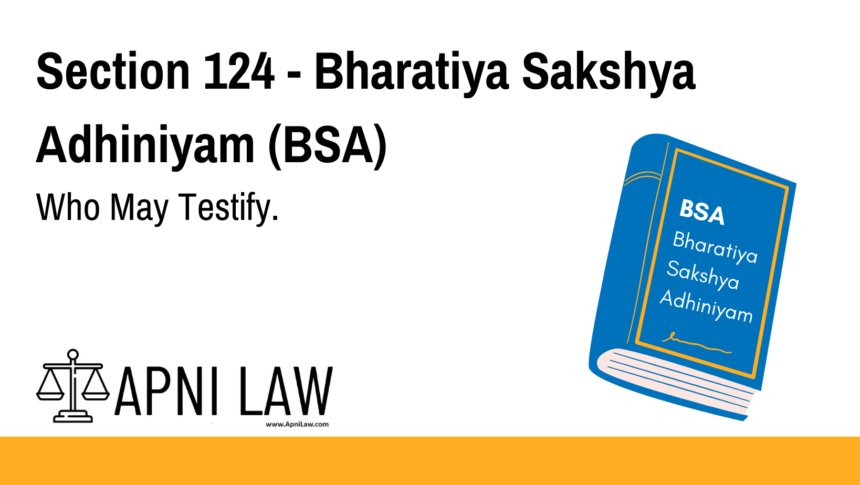Code: Section 124 – Bharatiya Sakshya Adhiniyam (BSA)
All persons shall be competent to testify unless the Court considers that they
are prevented from understanding the questions put to them, or from giving rational answers
to those questions, by tender years, extreme old age, disease, whether of body or mind, or
any other cause of the same kind.
Explanation.—A person of unsound mind is not incompetent to testify, unless he is
prevented by his unsoundness of mind from understanding the questions put to him and
giving rational answers to them.
Explanation of Section 124 – Who May Testify
Section 124 of the Bharatiya Sakshya Adhiniyam (BSA) defines who is legally competent to testify in a court of law. The general rule is that everyone is presumed competent unless the Court finds they are unable to understand the questions or give rational responses due to specific limitations.
Key Highlights:
- Every individual is presumed to be competent to testify.
- Competency is based on the ability to:
- Understand questions posed in Court.
- Provide rational, coherent answers.
- Grounds for incompetency include:
- Very young age.
- Advanced age that impairs comprehension.
- Mental or physical illness.
- Any other reason that affects understanding or rationality.
- A person of unsound mind is not automatically barred. If capable of comprehension and rational communication, they may testify.
This section ensures fairness by allowing courts to evaluate each witness’s capabilities rather than relying on rigid exclusions.
Illustrations
Example 1: Testimony by a Child
A six-year-old child sees a road accident. Before allowing the child’s testimony, the judge assesses whether the child understands basic questions. If the child is coherent, the testimony is accepted.
Example 2: Elderly Witness
An 82-year-old man is summoned to testify in a property case. Despite his age, he answers all questions logically. The court accepts his testimony as valid.
Example 3: Mental Illness and Testimony
A person with bipolar disorder is a key witness in a criminal trial. The court checks whether the person is in a stable condition and capable of understanding the proceedings. If so, the testimony is accepted.
Common Questions and Answers on Section 124 – BSA
- Can anyone testify in Court?
Yes. All individuals are considered competent unless the court determines otherwise based on their ability to understand and respond. - Can children testify under this section?
Yes. Children may testify if they demonstrate the ability to comprehend questions and answer appropriately. - Is mental illness a disqualification for testifying?
Not necessarily. The court will examine whether the individual can understand and provide rational responses. If they can, they may testify. - Does old age disqualify a witness?
No. Only if old age affects the person’s ability to comprehend or communicate. Otherwise, the witness remains competent. - Who decides whether a person is competent to testify?
The presiding judge evaluates each case based on facts and circumstances before making a decision.
Conclusion
Section 124 of the Bharatiya Sakshya Adhiniyam (BSA) promotes an inclusive and case-specific approach to witness competency. It prevents unjust disqualification based on age, illness, or mental health alone and empowers judges to assess each witness’s ability fairly. This provision upholds the principles of justice by balancing inclusiveness with reliability.
For detailed legal insights and case explanations, visit ApniLaw.








